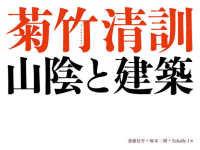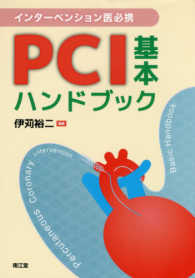- ホーム
- > 洋書
- > 英文書
- > Science / Mathematics
Full Description
A Global History of Influenza traces flu's changing identity as a global disease through the 20th century. This book explores how the virus was first characterised as an infectious disease without borders by British, European and American medical and public health professionals at the fin de siècle; it then illuminates the crucial role of the 1918-19 pandemic in transforming influenza into a paradigmatic global infection and one of the key problems of 20th-century international health.
Michael Bresalier charts the identification of the influenza virus in 1933 and how the subsequent development of new laboratory technologies to track the virus and produce vaccines underpinned the creation of the World Influenza Programme in 1948 - one of the very first initiatives of the World Health Organization (WHO). A Global History of Influenza illustrates that the fight against the disease was distinctly global in approach in the sixty years that followed and that this was built around a gift economy which facilitated the free circulation of virus samples, materials, techniques, skills, and information between nations, health organisations and vaccine manufacturers. Yet the re-emergence of flu as a major threat at the end of the 20th century caused this system to come under attack, with developing countries - led by Indonesia - threatening to withdraw from the WHO, citing poor access to influenza vaccines and other supposed key benefits as the cause.
This book shows that tensions and contradictions in global influenza control have deep historical roots and that international health systems based on ideas and practices of sharing can reproduce and create profound inequalities in access to vaccines, drugs and other vital medical resources. It is a vital study for anyone interested in the modern history of disease on a global scale.
Contents
Introduction: A Paradigmatic Global Infection
1. The Birth of a Global Disease, 1890-1945
2. Sharing Viruses: Post-War International Health and the Making of the World Influenza Programme, 1940-1958
3. Vaccine Economies: The Pharmaceuticalization of Influenza Control, 1950-1997
4. Virus Ecologies: Animal Reservoirs and the New Epidemiology of Influenza, 1970-2003
5. Bird Politics: Global Health and the Distribution of Biomedical Resources
Conclusion: Flu and the Making of the Global Health System
Bibliography
Index








